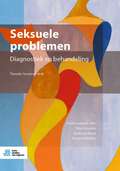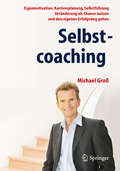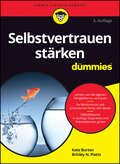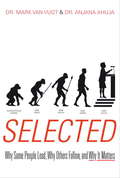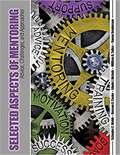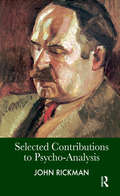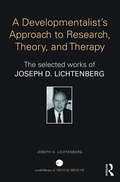- Table View
- List View
Seksuele problemen: Diagnostiek en behandeling
by Peter Leusink Gertruud Borst Yvonne MerkiesDit boek is een praktische handleiding bij het diagnosticeren en behandelen van seksuele problemen. De probleemgerichte en uniforme hoofdstukopbouw geeft houvast aan allen die in de klinische praktijk werken met mensen met seksuele problematiek. Stapsgewijs wordt onderscheiden welke interventies bij welke klacht passend zijn. Het boek biedt de seksuologische hulpverlener een praktisch naslagwerk in aanvulling op bekend veronderstelde kennis die zoveel mogelijk is geactualiseerd. Voor de niet-seksuologische professional biedt het boek een compact overzicht van noodzakelijke kennis om te kunnen diagnosticeren en vormt het een basis voor eenvoudige interventies en voor het adequaat verwijzen naar de seksuologische hulpverlening. Het boek is een herziening van het in 2010 gepubliceerde boek Seksuele disfuncties. Diagnostiek en behandeling. De hoofdstukken over seksuele disfuncties zijn geactualiseerd en drie hoofdstukken zijn toegevoegd: Hyperseksualiteit, Parafilie en Genderdysforie. De toegenomen inzichten in definitie, concept, diagnostiek en behandeling van deze problematiek, en de behoefte vanuit de klinische praktijk om meer houvast en eenduidigheid, zette ons tot deze uitbreiding aan. Tevens zijn vignetten aan elk hoofdstuk toegevoegd om de klinische toepassing te illustreren. Naast de tekst bevat elk hoofdstuk een beslismatrix waarin de te volgen strategieën in diagnostiek en behandeling beknopt worden weergegeven. De matrix duidt aan welke interventies bruikbaar zijn, mede afhankelijk van de complexiteit van het probleem en van de competenties waarover de clinicus beschikt. Diverse interventies zijn online beschikbaar. Redactie Dr. P. (Peter) Leusink, huisarts, seksuoloog NVVS, supervisor NVVS, docent, werkzaam bij de Seksuele Zaak, Utrecht Drs. G. (Gertruud) Borst, GZ-psycholoog/psychotherapeut, seksuoloog NVVS, systeemtherapeut NVRG, supervisor NVVS en NVRG, docent, werkzaam bij GGZ PsyQ Beverwijk Drs. Y. (Yvonne) Merkies, klinisch psycholoog/psychotherapeut, supervisor EMDR en VGCt, docent, manager behandelzaken bij Sinai Centrum
Selber denken kostet nichts: Wie Sie leere Parolen entlarven und lernen, sich selbst zu vertrauen
by Jürgen W. GoldfußTschakka! Ein oft gehörter Ausruf, wenn es um Motivation, Machbarkeit und Erfolg geht. Aber so einfach ist es nicht. Manch plakative Weisheiten gewisser Erfolgsgurus und Motivationstrainer entpuppen sich als heiße Luft. Banale Tipps für Wege aus der Jobkrise oder dem Leistungstief werden geschickt vermarktet und teuer verkauft. Auf das professionell inszenierte Motivations- und Stimmungshoch solcher Events folgt jedoch nicht selten die Ernüchterung. Oft scheitern die verheißungsvollen Erfolgstipps an den Grenzen des Berufsalltags. Schlimmstenfalls verfestigen sich Empfindungen wie Frustration oder Hilflosigkeit noch stärker als zuvor. Doch es geht auch anders. Der Autor Jürgen W. Goldfuß räumt auf mit leeren Erfolgsversprechen und wohlklingenden Worthülsen. Sein Credo: Jeder Mensch verfügt in sich selbst über ausreichend Know-how, um ein Leben ohne Stress und Burnout zu führen. Jeder hat ein ganz eigenes Repertoir an Werkzeugen, um sich immer wieder neu zu motivieren, selbst zu vertrauen und zufrieden zu leben. Der erfahrene Publizist, Berater und Hobby-Kabarettist unterstützt Sie mit nachvollziehbaren, leicht umsetzbaren Tipps. Unterhaltsam beleuchtet er alltägliche sowie außergewöhnliche Situationen und zeigt, wie Sie daraus Gewinn ziehen und Ihre eigene Persönlichkeit stärken können.
Selbst im Alltag: Qualitative Sekundäranalysen zu Identitätskonstruktionen im Wechselverhältnis von Normierung und Selbstentwurf
by Thomas Kühn Sabine Beckmann Patrick Ehnis Marina Mohr Katrin VoigtMithilfe von Sekundäranalysen qualitativer Interviews – geführt zwischen Ende der 1980er und Anfang der 2000er Jahre – analysieren die Autor*innen, wie sich gesellschaftliche Prozesse in der Arbeitswelt, im Geschlechterverhältnis sowie Einflüssen von Individualisierung, Aktivierung und Selbstoptimierung in der Konstruktion des Selbst niedergeschlagen. Erzählungen über Arbeit, Beziehung und Lebensführung verbinden die Autor*innen mit soziologischen und sozialpsychologischen Ansätzen zu Identitäts- und Subjektkonstruktionen. Dabei zeigen sie, wie der Kampf um Anerkennung, Autonomie und Authentizität, wie Zeitnutzungsdiskurse sowie Männlichkeits- und Weiblichkeitskonstruktionen das Alltagsleben und Lebensentscheidungen formen – stets im Spannungsfeld zwischen Unterordnung und Selbstermächtigung. Kritisch wird untersucht, wie Identitäts- und Subjektkonstruktionen mit der (Re)Produktion und (De)Legitimation sozialer Ungleichheitsverhältnisse zusammenhängen.
Selbstbestimmung und Causal Agency-Theorie: Von der Forschung in die Praxis
by Karrie A. Shogren Sheida K. RaleyDieses Buch führt die Causal Agency-Theorie als Rahmen zur Definition von Selbstbestimmung ein und beschreibt deren Entwicklung sowie wesentliche Merkmale. Es fasst die Forschung zur Förderung und Verbesserung der Selbstbestimmung zusammen und untersucht die praktischen Implikationen im Kontext von Behinderung über den Lebensverlauf. Das Buch hebt auch zukünftige Richtungen für Theorie, Forschung und Praxis in den Bereichen positive Psychologie und Behinderung hervor. Wichtige Themenbereiche umfassen: Theoretische Grundlagen der Entwicklung von Selbstbestimmung sowie Forschungsergebnisse und praktische Implikationen über den Lebensverlauf. Fragen im Zusammenhang mit der Umsetzung evidenzbasierter Praktiken zur Förderung von Selbstbestimmung im Kontext von Behinderung. Mögliche Strategien zur Überwindung von Barrieren für Selbstbestimmung durch forschungsbasierte Praktiken. Zukünftige Richtungen zur weiteren Integration der Causal Agency-Theorie in Interventionen der positiven Psychologie sowie in Unterstützungsstrukturen bei besonderen Beeinträchtigungen. Selbstbestimmung und Causal Agency-Theorie ist eine unverzichtbare Ressource für Forscher, Professoren und Graduiertenstudenten sowie für Kliniker, Therapeuten und andere Fachleute in den Bereichen Entwicklungs- und positive Psychologie, Bildungsrichtlinien und -praxis, Sonderpädagogik, Sozialarbeit, Ergotherapie, Sprach- und Sprachtherapie, öffentliche Gesundheit und Gesundheitspolitik.
Selbstcoaching: Eigenmotivation, Karriereplanung, Selbstführung - Veränderung als Chance nutzen und den eigenen Erfolgsweg gehen
by Michael GroßDas Berufsleben stellt uns immer wieder vor schwierige Entscheidungen, gewollte oder ungewollte Veränderungen, Konflikte, Phasen der Über- oder Unterforderung u.v.m. Wer heute erfolgreich sein will, sollte über Fähigkeiten verfügen, die uns helfen, diese Herausforderungen zu meistern: Selbstführungstechniken, Flexibilität, Veränderungsmotivation, Mut, ein "Gefühl für die Situation". Glücklicherweise sind diese Skills in jedem von uns angelegt! Dieses Buch will Ihnen helfen, sie herauszulocken und zu optimieren. Sie können es komplett lesen, oder Sie greifen danach, wann immer Sie vor einem konkreten Problem stehen: Teil 1 gibt Impulse, Ihre Motive, Stärken, Schwächen, Erwartungen zu analysieren und Ihre Ziele zu schärfen. Die Kapitel in Teil 2 gehen jeweils von typischen Situationen einer Berufskarriere aus, von der Berufswahl über Konfliktsituationen bis hin zu Gesundheitsproblemen, und helfen Ihnen, Schritt für Schritt Ihre ganz persönliche Herausforderung zu meistern. Teil 3 enthält einen Selbsttest: Wie steht es um meine Selbstführungs-Skills? Geschrieben von einem, der es wissen muss: Michael Groß ist nicht zuletzt durch seine Fähigkeit zur Selbstführung zum mehrfachen Schwimmolympiasieger und -weltmeister geworden und hat danach den Wandel vom Sportler zum promovierten Kommunikationswissenschaftler vollzogen. Durch seine heutige Tätigkeit als erfolgreicher Berater hat er die Praxiserfahrung, anderen seine "Skills" weiterzugeben. Lassen Sie sich durch seine Tipps und viele Beispiele aus der Biografie des Autors motivieren, die nächste Herausforderung in Angriff zu nehmen!
Selbstdisziplin in 365 Zitaten: Zitate für jeden Tag – ändere deine Gewohnheiten, stärke deinen Geist, erreiche deine Ziele
by Xabier K. Fernao„Wir sind, was wir immer wieder tun. Vorzüglichkeit ist daher keine Handlung, sondern eine Gewohnheit.“ – Aristoteles Was ist der wichtigste Faktor, der zwischen Armen und Reichen, Erfolgreichen und Erfolglosen, Glücklichen und Unglücklichen unterscheidet? Selbstdisziplin. Denk mal darüber nach. Wenn du disziplinlos im Beruf bist, häuft sich bald die Arbeit auf, und am Ende bist du gestresst und ausgebrannt. Wenn du disziplinlos mit deinem Geld umgehst, häufst du unnötige Kosten und Schulden auf und bist am Ende finanziell gestresst und ausgebrannt. Du siehst, worauf ich hinauswill. Aber wieso ein Buch mit „Selbstdisziplin in 365 Zitaten“? Stimmst du mir zu, dass Erfolg zu 80% von der Einstellung und nur zu 20% von Strategien und Mechanismen abhängt? Du siehst, worauf ich hinauswill. Die Leute jagen immer den 20% nach, den unrealistischen Dingen, und denken, dass die EINE große Idee sie zu disziplinierten Menschen machen wird. Aber so ist es nicht. Es sind die täglichen Impulse, Eingebungen und nicht zuletzt das Umfeld, die einen jeden Tag aufs Neue zur Disziplin motivieren. Ich weiß nicht, was du dir vorgenommen hast. Vielleicht ist es deine Traumfigur, der Waschbrettbauch, den du immer schon haben wolltest. Vielleicht ist es dein beruflicher Durchbruch, eine Null mehr hinter dem Jahreseinkommen. Es ist auch egal. Was ich aber über dich weiß: du bist jemand, der mehr will. Und das ist ziemlich großartig. Du willst mehr Geld, mehr Gesundheit, mehr Glück, mehr Sex, mehr Lebensfreude, mehr Wissen und mehr Freiheit… und daran ist absolut nichts verkehrt. Im Leben geht es darum, zu wachsen und sich weiterzuentwickeln. Wir können entweder jeden Tag ein bisschen wachsen oder jeden Tag ein bisschen sterben. Ich finde es unglaublich bewundernswert, dass du den Weg bergauf gewählt hast, den Weg des Wachstums und der Selbstdiszip
Selbstführung durch Coaching: Ein psychologisches Konzept zur Unterstützung von Coaching-Prozessen
by Isabell Braumandl Eva Jonas Christina Mühlberger Georg ZerleDieses Buch zum Selbstführungs-Coaching ist ein wissenschaftlich fundiertes Handbuch für PraktikerInnen mit einem konkreten Coaching-Konzept, einem roten Faden mit allen Materialien und Übungen für alle Coachingsitzungen und Materialien für eine prozess- und ergebnisorientierte Evaluation des Coachingprozesses. Einerseits wissenschaftlich fundiert, ist es für die AnwenderInnen verständlich aufbereitet und mit aktuellen Forschungsergebnissen angereichert. Zudem ist ein Evaluationsfragebogen für Coachingprozesse darin enthalten, der aus den letzten 10 Jahren Forschung nun erstmals so zusammen getragen wurde.Hier fließen aktuelle Erfahrungen und Erkenntnisse ein aus den Vergleichen von der Abhaltung der Coachingausbildungen sowie Coachings in Präsenz vs. virtuellem Coaching.
Selbstgefühl: Kann Selbstbewusstsein als Gefühl verstanden werden?
by Gerhard KreuchDiese Monographie bietet neue Einblicke in die Verbindung zwischen Selbstbewusstsein und Emotion. Sie konzentriert sich auf die Frage, was uns die grundlegenden "Gefühle des Seins" über uns selbst sagen. Die Ergebnisse bereichern die Philosophie der menschlichen Affektivität und tragen dazu bei, ein neues Licht auf einige dringende, aktuelle Probleme zu werfen. Der Autor versucht, das Selbstbewusstsein als ein affektives Phänomen zu verstehen, nämlich als Selbstgefühl. Er identifiziert es als ein präreflexives, präpropositionales, körperliches Gefühl, das unseren Möglichkeitsraum formt. Es ist die affektive Offenlegung der individuellen Existenz. Seine Darstellung überwindet die Schwierigkeiten des unendlichen Regresses und der bösartigen Zirkularität, mit denen reflexive (oder übergeordnete) Darstellungen des Selbstbewusstseins zu kämpfen haben. Gleichzeitig hilft sie, eine Brücke zwischen der grundlegenden Ebene des Selbstbewusstseins und der höheren Ebene der substanzielleren Gedanken über sich selbst zu schlagen. Der Titel befasst sich mit grundlegender Affektivität, Matthew Ratcliffes Theorie der existentiellen Gefühle, Merkmalen des Selbstgefühls sowie Angemessenheit und Unangemessenheit in der Selbstinterpretation. Außerdem werden die Beiträge der Heidelberger Schule des Selbstbewusstseins zu den aktuellen Debatten erörtert. Der Titel bietet Studenten und Forschern einen einzigartigen Einblick in so wichtige philosophische Fragen wie: Was ist Selbst-Bewusstsein? Wie können wir uns selbst erkennen? Er wird auch ein breiteres Publikum ansprechen, das sich für das Selbstbewusstsein und/oder die menschliche Affektivität interessiert, da er keine Kenntnis des Fachjargons voraussetzt.
Selbstheilung durch Vorstellungskraft
by Gary Bruno SchmidDieses Buch widmet sich dem Themenkomplex Vorstellungskraft als Heilmittel. Der Autor – theoretischer Physiker, Psychologe, Psycho- und medizinischer Hypnotherapeut – hat die wissenschaftliche Literatur über psychogene Heilung gesammelt, kritisch bewertet und um neue Daten und Erkenntnisse, basierend auf jahrzehntelanger Erfahrung, erweitert. Das Spektrum reicht von einfacher Entspannung über Psychoneuroimmunologie bis zur Selbstheilung durch Vorstellungskraft. Da die Psychoneuroimmunologie – evidenzbasierte Grundlage für psychogene Reaktionen des menschlichen Organismus, wie z. B. Entspannung, Placebo-/Noceboeffekt oder medizinische Hypnose – selten explizit Bezug auf die Vorstellungskraft nimmt, führt der Autor den Begriff der Bewusstseinsmedizin ein. Er erläutert die psychoneuroimmunologischen Zusammenhänge der Vorstellungskraft und entwickelt eine einfache, generische Sechs-Dramaturgische-Elemente-Methode für die praktische Anwendung der medizinischen Hypnose zur Selbstheilung, die anhand konkreter Beispiele aus der Praxis dargestellt wird. Der Leitsatz seiner Erkenntnisse lässt sich so zusammenfassen: “Jede Heilung ist letztendlich immer eine Selbstheilung und die Vorstellungskraft dient als Heilmittel.“
Selbstmanagement im Ruhestand: Coachingmodelle für mehr Resilienz und Gelassenheit im Alter
by Wolfgang SchieleDieses Buch übernimmt eine Doppelfunktion: Es stellt in leicht verständlicher Form erfolgreiche Coachingmodelle vor und fungiert zugleich als anwendungsorientierter Ratgeber für ein harmonisches und ausgeglichenes Leben im Übergang vom Beruf in den Ruhestand. Die in verdichteter Form vorgestellten Formate und Interventionen stehen in einem festen Bezug zum alternden Menschen. Sie geben dem Leser Werkzeuge an die Hand, um die Herausforderungen des fortgeschrittenen Erwachsenenalters im Selbstmanagement zu meistern und die psychische Widerstandskraft im Alter zu stärken. Die reiche Ausstattung des Werkes mit Grafiken, Arbeitsblättern und Testangeboten erleichtert dem Leser den Zugang zu den Modellen und macht Lust auf das Ausprobieren der vorgeschlagenen Übungen im Selbstversuch.
Selbstmitgefühl im Sport: Selbsthilfe in sportlichen Krisen
by Petra JansenNiederlagen, Rückschläge und Krisen gehören im Leistungssport dazu. Lange Zeit galt jedoch das Motto: „Was mich nicht umbringt, härtet mich ab“ und in Krisenzeiten wurde noch härter trainiert. In diesem Sachbuch erfahren Sie, wieso diese Denkweise aus wissenschaftlicher Sicht veraltet ist und für die sportliche Karriere schädlich sein kann. Selbstfreundlichkeit, Achtsamkeit und das Gefühl, in der Niederlage nicht allein zu sein, sind die drei Säulen des Selbstmitgefühls und Schlüsselkonzepte, um in krisenhaften sportlichen Situationen zu bestehen. Dieses Sachbuch vermittelt die theoretischen Grundlagen des Selbstmitgefühls und hebt insbesondere die Bedeutung der Arbeiten zum Selbstmitgefühl im Sport hervor. Die Theorie wird durch praktische Übungen und durch Experteninterviews aus den unterschiedlichen sportlichen Bereichen ergänzt. Ein Selbstmitgefühlstraining bietet so viel mehr als andere sportpsychologische Trainings, weil es mit einer warmherzigen Atmosphäre einhergeht. Werden Sie Ihr eigener mitfühlender Couch, der Sie liebevoll durch die Wellen der sportlichen Leistungsfähigkeit begleitet und Ihnen hilft, in sportlichen Krisen nicht unterzugehen.
Selbstmord in Bangladesch: Epidemiologie, Risikofaktoren und Prävention
by S. M. Yasir Arafat Murad M. KhanDieses Buch befasst sich umfassend mit suizidalem Verhalten in Bangladesch. Es basiert auf vorhandenen Erkenntnissen und Fachwissen und behandelt im Speziellen die Bereiche Epidemiologie, Quellen für Qualitätsdaten, lokale Kultur, forensische und rechtliche Aspekte, Gesundheit und psychische Versorgung, Medien und Suizid, Krisenmanagementsystem, Suizidprävention und den Stand der Erkenntnisse im Land. Dieses Buch ist das erste seiner Art, das sich mit verschiedenen Aspekten der Suizidalität in Bangladesch befasst.
Selbstorganisation mit Holakratie: …eine Frage der Kultur! (essentials)
by Andreas Hertel Jeanette Herzog Dominik GrolimundFormen der Selbstorganisation wie Holakratie ermöglichen es Unternehmen, den dynamischen Herausforderungen unserer Zeit agiler zu begegnen. Der Fokus der Organisation richtet sich auf Sinn und Wirkung des Handelns – ohne zentrale Steuerung. Mit dem Buch erleichtern wir den Leser:innen den Einstieg in die Welt der Holakratie auf Basis einer Organisationskultur, die geprägt ist von resonanten, vertrauensvollen Beziehungen, psychologisch sicheren Teams und inklusiver Führung. Zudem weisen wir auf kritische Aspekte hin und geben praktische Beispiele.
Selbstregulation spielerisch fördern: Ein Manual zur Unterstützung von Eltern
by Gitta Reuner Kim Angeles Erdmann Verena Vetter Michaela Schäferling Silke HertelDas Elterntraining ist als präventives Unterstützungsangebot für Eltern früh- und reifgeborener Kinder im Alter von 2-3 Jahren konzipiert. Es behandelt in 6-8 Sitzungen die Entwicklung der Selbstregulation und die co-regulatorische Funktion der Eltern. Das Programm EL-KIDS zeigt Möglichkeiten auf, wie Eltern spielerisch, stressfrei und in liebevoller Atmosphäre die kindliche Entwicklung der Selbstregulation unterstützen können. Im Manual werden der wissenschaftliche Hintergrund und Evaluationen vorgestellt. Der praktische Teil umfasst Zeit- und Sequenzpläne, Durchführungsmaterial und Problembehandlungen, so dass Fachpersonen an Frühfördereinrichtungen, Sozialpädiatrischen Zentren oder in der Praxis das Programm anwenden können.
Selbstregulationsstrategien und Gesundheitsverhalten: Konzeption, Evaluation und Wirkbedingungen einer ernährungsbezogenen Intervention (Gesundheitspsychologie)
by Tanja DewittAuf Basis aktueller Erkenntnisse zu positiven Effekten der Selbstregulationsfähigkeit auf das Gesundheitsverhalten wird in diesem Buch eine Intervention konzipiert und evaluiert, die in der aufsuchenden Primärprävention einsetzbar ist. Hierbei werden relevante Theorien, entsprechende Evidenz und höchst aktuelle Diskussionen in der gesundheitspsychologischen Interventionsforschung mit einbezogen. Die Intervention basiert auf der Vermittlung ausgesuchter Selbstregulationsstrategien. Die Wirksamkeit wird im Vergleich zu einer Kontrollgruppe geprüft und dabei Adhärenz, Persönlichkeit und Stress als mögliche Wirkbedingungen einbezogen.
Selbstvertrauen stärken für Dummies (Für Dummies)
by Kate Burton Brinley N. PlattsEin bisschen mehr Selbstbewusstsein könnte den meisten von uns nicht schaden. In diesem Buch zeigen Ihnen Brinley Platts und Kate Burton, wie Sie am Arbeitsplatz, in einer Beziehung oder in einer Runde mit fremden Menschen Ihren Stärken vertrauen können. Sie erfahren, was Selbstbewusstsein ausmacht, und wie Sie es entwickeln können, wie Sie mit Erwartungen anderer umgehen und wie Sie Ihren eigenen Standpunkt freundlich und gelassen vertreten. Übungen und Checklisten helfen Ihnen, sich Ihrer Stärken bewusst zu werden und Ihre Zweifel zu überwinden.
Selbstvertrauen stärken für Dummies (Für Dummies)
by Kate Burton Brinley PlattsEin bisschen mehr Selbstbewusstsein könnte ab und zu nicht schaden. In diesem Buch zeigen Ihnen Brinley Platts und Kate Burton, die Koautorin von »Neuro-Linguistisches Programmieren für Dummies«, wie Sie am Arbeitsplatz, in einer Beziehung oder in einer Runde mit fremden Menschen Ihren Stärken vertrauen können. Sie erfahren, was Selbstbewusstsein ausmacht, und wie Sie es entwickeln können, wie Sie mit Erwartungen anderer umgehen und wie Sie Ihren eigenen Standpunkt freundlich und gelassen vertreten. Übungen und Checklisten helfen Ihnen, sich Ihrer Stärken bewusst zu werden und Ihre Zweifel zu überwinden.
Selected
by Mark Van Vugt Anjana AhujaA groundbreaking, evolutionary science-based exploration of the history of leadership that explains how and why some men and women evolve into good or great leaders, and some do not.We are all leaders or followers -- or both. We can recognise leadership in almost every area of life: in the workplace, among friends, within families, in politics and religion. But what makes a good or bad leader, and what makes an outstanding one? Selected examines how and why leadership has evolved over tens of thousands of years, and presents a bold and compelling new "mismatch hypothesis": the slowness of evolution means that there is a mismatch between modern leadership and the kind of leadership that our Stone Age brains are still wired for. This makes for all sorts of tendencies, problems and solutions that no author has yet discussed but that affect all aspects of our lives.Full of fascinating examples drawn from a diverse range of spheres, from politics and commerce to sport and culture, Selected explains why taller political candidates usually win, why women chief executives attract such hostility, why we like it when the boss asks after our children and what prime ministers and presidents can do to improve their chances of electoral success.This is the first book of its kind -- reaching into business, psychology, politics and current affairs -- to explore how leadership affects us all. It also offers the first truly scientific theory of leadership: where previous books have provided anecdote, it details empirical evidence. Selected provides deep insight into our personal and professional lives at a time when the world urgently needs to acknowledge great leadership.From the Hardcover edition.
Selected Aspects of Mentoring: Advice Assumptions Challenges and Approaches
by Staff William B. Talley Benson Cooke Schuyler Webb Ramar Henderson Edwin J. Nichols Nichols And Associates Inc.The publication captures the concept and application of mentoring as an age-old method of training and learning that has existed in all societies throughout recorded history and continues to impact virtually everyone across their life span. Moreover, it illuminates how mentoring has been indelibly institutionalized, embedded, wrapped and weaved, and advanced throughout our past and contemporary history and culture. <P><P> Selected Aspects of Mentoring: Advice, Challenges, and Approaches: As experience best measures knowledge, not necessarily by years, the authors contend that time alone does not make individuals more knowledgeable, but learning does. Therefore, mentoring is a learning vehicle for personal development for the mentor, mentee, as well as their respective organization’s development. <P><P> The book examines the mentoring relationship and experience across a spectrum of organizations. It may provide a type of “stimulus package” for engaging in the mentoring process on a higher level, improving the mentoring processes across the organization or discipline, and facilitate progressive, positive outcomes. <P><P> The authors offer a timely, diverse, and thought-provoking book to assist mentors and mentees in the world of work or any organization – administration, education, training, research, non-profit, corporation, youth programs, military, sports – to understand the dynamics, application, and benefits of mentoring. The authors also advocate for the transformational benefits attributable to the dyadic relationship between mentors and those being mentored. <P><P> It offers provocative paradigms about the utility of mentoring and mentoring programs as well as timeless, inspiring quotes and insightful anecdotes and experience of the dynamic process. <P><P> The book encourages sharing the advantages of mentoring tools and methods that effect trajectories toward more positive outcomes across diverse groups.
Selected Contributions to Psycho-Analysis
by John RickmanA most welcome re-issue of John Rickman's classic collection of papers, with a preface by Pearl King, to partner her edited volume, No Ordinary Psychoanalyst: The Exceptional Contributions of John Rickman, also published by Karnac.
Selected Papers of Donald Meltzer - Vol. 1: Personality and Family Structure
by Donald MeltzerThe contents of the three volumes are grouped not chronologically but under the headings of 'Personality and Family Structure', 'Philosophy and History of Psychoanalysis', and 'The Psychoanalytic Process and the Analyst'. Together they present his interpretation of the 'Kleinian development' from Freud, through Abraham and Klein, to Bion and the post-Kleinian model; and within this evolution, his view of the natural history of the psychoanalytic process, the aesthetics of the method, and his insights into the operation of the transference and countertransference. Meltzer saw the psychoanalytic process as a new method that contributes alongside more traditional art-forms to our scientific knowledge of the mind. Working with both adults and children, he viewed psychoanalysis in developmental rather than narrowly therapeutic terms, with potential for both analyst and analysand. All his theories derived from clinical work, above all from dream-reading and children's phantasy play; and owing to his extensive international teaching experience, his own material was enriched by that of many supervisees. This collection of papers, read as a whole, invites new readers to follow and partake in what he called 'the most interesting conversation in the world'.
Selected Papers of Donald Meltzer - Vol. 2: Philosophy and History of Psychoanalysis
by Donald MeltzerThe contents of the three volumes are grouped not chronologically but under the headings of 'Personality and Family Structure', 'Philosophy and History of Psychoanalysis', and 'The Psychoanalytic Process and the Analyst'. Together they present his interpretation of the 'Kleinian development' from Freud, through Abraham and Klein, to Bion and the post-Kleinian model; and within this evolution, his view of the natural history of the psychoanalytic process, the aesthetics of the method, and his insights into the operation of the transference and countertransference. Meltzer saw the psychoanalytic process as a new method that contributes alongside more traditional art-forms to our scientific knowledge of the mind. Working with both adults and children, he viewed psychoanalysis in developmental rather than narrowly therapeutic terms, with potential for both analyst and analysand. All his theories derived from clinical work, above all from dream-reading and children's phantasy play; and owing to his extensive international teaching experience, his own material was enriched by that of many supervisees. This collection of papers, read as a whole, invites new readers to follow and partake in what he called 'the most interesting conversation in the world'.
Selected Papers of Donald Meltzer - Vol. 3: The Psychoanalytic Process and the Analyst
by Donald MeltzerThe contents of the three volumes are grouped not chronologically but under the headings of 'Personality and Family Structure', 'Philosophy and History of Psychoanalysis', and 'The Psychoanalytic Process and the Analyst'. Together they present his interpretation of the 'Kleinian development' from Freud, through Abraham and Klein, to Bion and the post-Kleinian model; and within this evolution, his view of the natural history of the psychoanalytic process, the aesthetics of the method, and his insights into the operation of the transference and countertransference. Meltzer saw the psychoanalytic process as a new method that contributes alongside more traditional art-forms to our scientific knowledge of the mind. Working with both adults and children, he viewed psychoanalysis in developmental rather than narrowly therapeutic terms, with potential for both analyst and analysand. All his theories derived from clinical work, above all from dream-reading and children's phantasy play; and owing to his extensive international teaching experience, his own material was enriched by that of many supervisees. This collection of papers, read as a whole, invites new readers to follow and partake in what he called 'the most interesting conversation in the world'.
Selected Papers of Joseph Lichtenberg: The World Book of Psychoanalysis (World Library Of Mental Health Ser.)
by Joseph LichtenbergThe World Library of Mental Health celebrates the important contributions to mental health made by leading experts in their individual fields. Each author has compiled a career-long collection of what they consider to be their finest pieces: extracts from books, journals, articles, major theoretical and practical contributions, and salient research findings. Leading psychoanalyst Joseph D. Lichtenberg is one of the most experienced and best respected psychoanalysts working in the US at present. In A Developmentalist's Approach to Research, Theory, and Therapy, he provides the reader with an opportunity to track the development of his conceptions in three realms of psychoanalysis: Infant studies and developmentalist perspectives on the life cycleTheoretical contributions to self-psychology Motivational clinical contributionsJoseph Lichtenberg is a hugely influential name within US Psychoanalysis circles; this is the first collection of the seminal papers from his very long and distinguished career.
Selected Papers on Psychoanalysis
by Karl AbrahamCovering a wide range of topics, the collection consists of twenty-six papers and essays published over a period of two decades. Readers of this book are thus enabled to trace the analyst's development, in which his scientific approach is evident throughout, from his earliest papers through to his last works. First published in 1927 in the International Psychoanalytical Library, the author's Selected Papers on Psychoanalysis has since established itself as on of the seminal works essential to the training of workers in the psychoanalytic field. Includes the author's classic paper A Short Study of the Development of the Libido.
